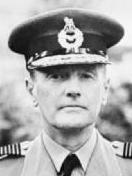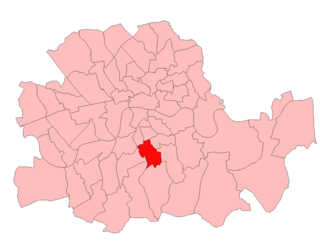
The 1945 Chelmsford by-election was a parliamentary by-election for the British House of Commons constituency of Chelmsford, Essex on 26 April 1945.

The 1945 Chelmsford by-election was a parliamentary by-election for the British House of Commons constituency of Chelmsford, Essex on 26 April 1945.
The by-election was caused by the death of the sitting Conservative MP, John Macnamara. He was killed on active service in Italy on 22 December 1944. He had been MP here since holding the seat in 1935.
Chelmsford had been won by the Conservative Party at every election since 1924, when they re-gained the seat from the Liberals, and was now a safe seat. The result at the last General election was as follows;
| Party | Candidate | Votes | % | ±% | |
|---|---|---|---|---|---|
| Conservative | John Macnamara | 28,314 | 70.8 | ||
| Labour | Fred Hughes | 11,690 | 29.2 | ||
| Majority | 16,624 | 41.6 | |||
| Turnout | 40,004 | 65.4 | |||
| Conservative hold | Swing | ||||
The local Conservatives selected 35-year-old Flight Lieutenant Brian Cook. Before the war he was a painter, designer and publisher. [2] The Labour party had selected Dr Mary Day to contest a General Election expected to take place in 1939-40. [3] There had been no Liberal selected.
At the outbreak of war, the Conservative, Liberal and Labour parties had agreed an electoral truce which meant that when a by-election occurred, the party that was defending the seat would not be opposed by an official candidate from the other two parties. When the Labour and Liberal parties joined the Coalition government, it was agreed that any by-election candidate defending a government seat would receive a letter of endorsement jointly signed by all the party leaders.
The Common Wealth Party put forward 29-year-old Ernest Millington as candidate. He served with the RAF Bomber Command during the Second World War, where he rose to the rank of wing commander and was awarded the Distinguished Flying Cross in 1945.
Polling day was set for 26 April 1945. When nominations closed, it was to reveal a two horse race, between the Conservative Cook and Millington for the Common Wealth party.
Cook received a joint letter of endorsement from all the leaders of the parties in the coalition.
Millington advocated a socialist programme based on nationalisation of the land and public ownership.
Millington gained the seat;
| Party | Candidate | Votes | % | ±% | |
|---|---|---|---|---|---|
| Common Wealth | Ernest Millington | 24,548 | 57.5 | New | |
| Conservative | Brian Cook | 18,117 | 42.5 | -28.3 | |
| Majority | 6,431 | 15.0 | N/A | ||
| Turnout | 42,665 | 54.1 | -11.3 | ||
| Common Wealth gain from Conservative | Swing | ||||
When the 29-year-old Millington took his seat, he was the youngest MP in the House, which had been elected in 1935. The victory signalled the shift in public opinion that led the Labour party to pull out of the wartime coalition government and win a landslide victory in the 5 July 1945 general election. Millington held his seat in the 1945 general election and joined the Labour Party in April 1946. The result at the following General election;
| Party | Candidate | Votes | % | ±% | |
|---|---|---|---|---|---|
| Common Wealth | Ernest Millington | 27,309 | 46.7 | ||
| Conservative | Hubert Ashton | 25,229 | 43.2 | ||
| Liberal | Hilda Buckmaster | 5,909 | 10.1 | ||
| Majority | 2,080 | 3.5 | |||
| Turnout | 58,447 | 73.4 | |||
| Common Wealth hold | Swing | ||||
Cook, as Brian Batsford, was elected as Tory MP for Ealing South at a by-election on 12 June 1958.
The 1922 Newport by-election was by-election held in the parliamentary constituency of Newport in Wales on 18 October 1922. The by-election attracted especial attention, both at the time and since, as it was seen as a crucial electoral test of the viability of the Lloyd George Coalition Government, formed of followers of David Lloyd George with the Conservative Party, the latter of which contained an increasing number of members who wished to leave the coalition and regain the party's independence.
The 1943 Darwen by-election was a by-election held on 15 December 1943 for the British House of Commons constituency of Darwen in Lancashire.
The 1945 Caernarvon Boroughs by-election was a parliamentary by-election held on 26 April 1945 for the British House of Commons constituency of Caernarvon Boroughs.
The 1943 University of Wales by-election was a parliamentary by-election held in the United Kingdom between 25 and 29 January 1943 for the House of Commons constituency of University of Wales.
The 1932 Cardiganshire by-election was a parliamentary by-election held on 22 September 1932 for the British House of Commons constituency of Cardiganshire.

Sir Sydney Walter John Robinson JP was an English farmer, building contractor and Liberal politician.
The 1917 Spalding by-election was a parliamentary by-election held for the British House of Commons constituency of Spalding in Lincolnshire on 25 October 1917.
The 1917 Edinburgh South by-election was a parliamentary by-election held for the House of Commons constituency of Edinburgh South in Scotland on 12 May 1917.
The 1922 Chertsey by-election was a parliamentary by-election for the British House of Commons constituency of Chertsey on 24 March 1922.
The 1923 Ludlow by-election was a parliamentary by-election for the British House of Commons constituency of Ludlow, Shropshire, on 19 April 1923.
The 1928 Tavistock by-election was a parliamentary by-election for the British House of Commons constituency of Tavistock on 11 October 1928.
The 1939 Brecon and Radnorshire by-election, was a parliamentary by-election held on 1 August 1939 for the British House of Commons constituency of Brecon and Radnorshire, in South Wales.

The 1942 Grantham by-election was a parliamentary by-election for the British House of Commons constituency of Grantham on 25 March 1942.

The 1938 Aylesbury by-election was a parliamentary by-election for the British House of Commons constituency of Aylesbury on 19 May 1938.
The 1942 Rugby by-election was a parliamentary by-election for the British House of Commons constituency of Rugby on 29 April 1942.
The 1943 Eddisbury by-election was a parliamentary by-election for the British House of Commons constituency of Eddisbury on 7 April 1943.

The 1944 Bury St Edmunds by-election was a parliamentary by-election for the British House of Commons constituency of Bury St Edmunds, Suffolk on 29 February 1944.
The 1943 Daventry by-election was a parliamentary by-election for the British House of Commons constituency of Daventry, Northamptonshire, on 20 April 1943.
The 1944 Skipton by-election was a parliamentary by-election for the British House of Commons constituency of Skipton, Yorkshire held on 7 January 1944.

The 1920 Camberwell North West by-election was a parliamentary by-election held for the British House of Commons constituency of Camberwell North West in the South London district of Camberwell on 31 March 1920.